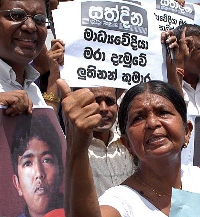Sri Lanka journalists stop reporting on fighting
Dozens of journalists have stopped reporting on fighting in Sri Lanka's north and east because it is too dangerous.

In the most recent violence, a suspected Tamil rebel boat exploded off Sri Lanka's east coast Friday, killing at least three insurgents, as clashes between rebels and soldiers in the north left four guerrillas dead, the military said.
"The pressures on the media have multiplied over the recent months with increasing fears for the safety of journalists, especially those operating in the embattled north and east," a panel representing 11 media watchdogs said in a statement released Friday at the end of a four-day mission to the island.
"In Jaffna peninsula, dozens of journalists have been forced to stop working for fear of their safety," the panel said, referring to a northern region where clashes for territory between separatist Tamil Tiger rebels and government forces have intensified in the past 19 months.
The group including the International Federation of Journalists, the International Press Institute, Reporters Without Borders and Sri Lanka's Free Media Movement accused the government, Tamil rebels and government-backed paramilitary groups of media rights violations.
It said verbal attacks by government ministers against the media encourage "a climate of self-censorship, which is damaging the free flow of information."
The statement also said that, aside from the arrest and detention of journalists, authorities stifle media in Jaffna by restricting deliveries of printing supplies and by arranging for revenue officers to raid publishing companies.
In rebel-controlled areas, "freedom of expression and freedom of movement continue to be heavily restricted preventing access to information and the representation of diverse opinions," the group said.
Both the government and insurgents restrict journalists' access to conflict zones, meaning reporters cannot adequately cover the conflict and have to rely on information provided by the opposing sides, the statement said.
Government Information Director Anusha Pelpita said late Friday he could not comment as he had yet to see the watchdogs' statement. Rebel spokesman Rasiah Ilanthirayan was not immediately available.
The government and Tamil guerrillas have consistently been accused of trying to muzzle the independent media since the separatist conflict intensified in December 2005 after years of relative calm.
Clashes, assassinations and air attacks in the past 19 months have killed more than 5,000 people and took the death toll from two decades of fighting past 70,000.
Tamil Tiger rebel have been fighting the government since 1983 to create an independent homeland for the country's ethnic minority Tamils who have suffered discrimination by successive majority Sinhalese-controlled governments.
Both sides have largely ignored a 2002 Norway-brokered cease-fire but neither have officially withdrawn from the agreement.
Subscribe to Pravda.Ru Telegram channel, Facebook, RSS!

